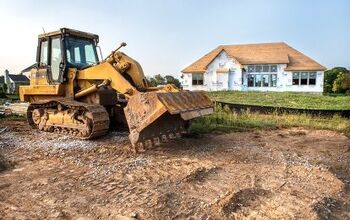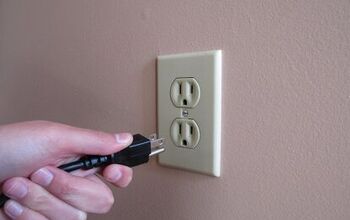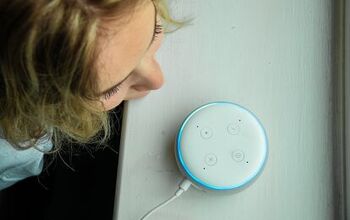What Does It Mean When Copper Wire Turns Black?

Discovering blackened copper wires is a mysterious thing. What happened to these wires? Is this dangerous? Keeping a close eye on your electrical system helps you avoid future disasters. Over 20,000 house fires are started each year due to an electrical fault. This article will tell you why your copper wires turned black, if blackened wires are a hazard, and what you can do about it.
Copper wire can turn black due to a process call oxidization. When the copper comes into contact with oxygen, the reactions slowly cause the wire to form a black and sometimes green coating. Copper wires will turn black when in contact with moisture. Also, black copper wires were correlated with drywall imported to the US from China between 2001-2009.
As you can see, it’s natural for copper wires to become discolored over time. However, this process can speed up or slow down based on other environmental factors. We will explain all this below and alert you to any possible dangers.
Do You Need to Hire an Electrician?
Get free, zero-commitment quotes from electricians near you.

Why is Copper Wire Going Black?
Copper is a versatile metal. Copper wire does not rust, but it will oxidize and tarnish over time. When it does, it usually turns a greenish color. This is called a patina (a great example is the statue of liberty). The patina is not generally damaging to the wire, and it should still function. However, over time copper can begin to erode – especially under certain situations. See the chart below to understand how various metals corrode.
| Metal Type | How it Corrodes | How it Appears | Effects on Metal |
| Steel | Oxygen binds with iron. Faster with moisture | Orange rust | Structurally damaging |
| Aluminum | Oxygen binds with aluminum | White exterior crust | Not damaging unless sulfide and chlorides present |
| Copper | Oxygen binds with copper | Green patina or black coating | Not usually damaging. More resistant than aluminum |
Let’s go over several of the reasons why copper wire will corrode and become black.
- Contact with moisture
- In the same room as a pool cleaner
- Drywall imported from China is installed in the house
- Overheated wire
Let’s unpack these.
Copper Wires Turn Black With Increased Moisture
Moisture essentially speeds up the oxidation process. If your wires were in a damp basement, or there is a water leak nearby, you’re more likely to see blackened wires. Copper doesn’t rust, but it’s a good comparison to steel. When steel, or any metal high in iron, comes into contact with water, it vastly increases the propensity for rust to form.
The same is true with copper. When moisture is near, the wire is more likely to change colors. If you have black wires, peer around the room to see if there are any unseen moisture sources.
Sometimes Copper Wire Will Turn Black when Pool Cleaner is Stored Nearby
This is an odd one – however, it is reported among people who own pools and might store pool cleaner nearby. There are different types of cleaner and chemicals used to clean pools. Just be wary of anything you keep near any exposed wires – some things can cause a reaction with the copper wire.
Now is a good time to point out: anything releasing sulfuric compounds will cause your copper wires to corrode. This includes some types of batteries or a nearby sewer leak. If you think any of these things may have been in the vicinity of the wires, then they may be the cause of black copper wires.
Several more things can cause the copper wire to turn black – and these are more dangerous. Read below for more information. Also, see this article on making safe wire connections.
Chinese Drywall Causing Copper Wire to Turn Black
The years between 2001 and 2009 was a major era for manufacturing homes. Much of the increased manufacturing was the result of several hurricanes. The US couldn’t keep up with the drywall demand, so they ordered a bunch from China.
This seemed like a solution to the drywall shortage until people started reporting some strange symptoms, including finding black copper wires throughout their homes. People began to perform laboratory tests, and they discovered that the imported drywall contained different harmful components.
The effects on the copper wire were noticeable; however, so were the health problems. Some reported difficulty breathing, runny nose, and headaches – almost like a constant allergic reaction. If you have noticed that you have black copper wires throughout your house, and there are no other explanations, then you should check for Chinese drywall. Here are a few ways to figure out if you have some of this drywall in your home:
- A sulfur smell, like rotten eggs or a fried car battery. The odor may be there, but hard to trace.
- A home built or rebuilt between 2001-2009. This is the period that saw the most use of the Chinese drywall. If you’re concerned you have it in your home, contact a professional to come and investigate.
- Black copper wires. If you have widespread blackening of copper wires in your home, you should be suspicious of imported drywall.
Read below for more reasons your copper wire turned black.
Copper Wire Turns Black from Over Heating
Overheating is another reason your copper wire may have turned black. If the wires become loose or there is a massive electricity surge, your copper wires may become black. Also, if there is a failure at the wire site, you could have arcing – this is very dangerous and could cause a fire.
Some obvious signs of overheating would include melting insulation around the wire, black soot on the nearby wires and boxes, or a history of overheating. Some homes have a bad or outdated electrical system. If this was never corrected, then you will continue to have issues.
The Dangers of Black Copper Wire
The first several reasons we listed for black copper wire – air, moisture, and pool cleaner/chemicals – are not as dangerous as the last couple of reasons listed.
Chinese imported drywall and arcing wires can present an immediate hazard to you and your family. If you’ve recently experienced either of these issues or highly suspect them, you should immediately contact a professional. It’s simply not worth the continued risks.
If you’ve had a severely damaged electrical panel, see our article on how long it takes for a professional to replace it.
Do You Need to Hire an Electrician?
Get free, zero-commitment quotes from electricians near you.

Related Questions
Copper wire will turn black and green. Copper wire turning green is a natural and expected part of coppers’ life cycle. Just like copper wire turning black, copper wire turns green from increased exposure to moisture and water.
Whether your wire turns green or black will have to do with the makeup of your copper and the surrounding conditions. In general, copper wire is more likely to turn green when in contact with pool cleaner, moisture, and oxygen. Copper wire is more likely to turn black with overheating or contact with high sulfuric exposure. These are general guidelines; the two colors can have some overlap.
How Do You Clean Black Copper Wire?Copper wire can be cleaned with a mixture of salt and vinegar. These two components will eat away at the black area, bringing your copper back to a nice shine. The formula for this can vary, but one tablespoon of salt mixed with 1 cup of vinegar has been an effective cleaner. Be sure you’re not doing this to a live wire. Always take necessary safety precautions.
What is the Conductivity of Oxidized Copper Wire?Copper wire that is oxidized is still a good conductor of electricity. In fact, the initial patina that forms can protect the wire. This resilience is one reason that wires are made of copper. Aluminum oxidizes quicker and loses conductivity easier. Eventually, the severely corroded copper wire will begin to lose some conductivity; however, if your wires a well-protected, this will take a very long time.
Related Guides

Gideon is a writer and hobby woodworker. He enjoys working on projects small and large-everything from crafting boxes and benches, to replacing carpet and landscaping a yard.
More by Gideon Zielinski



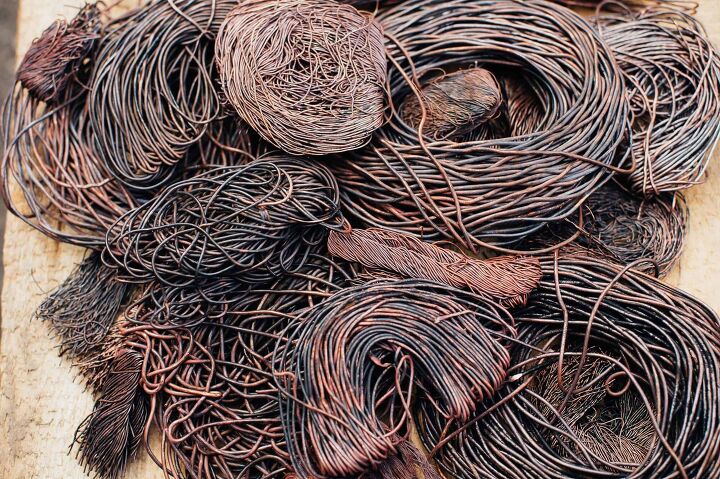








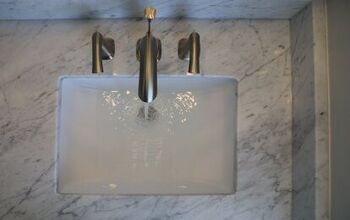

![10 Best Scroll Saws for 2022 [Ultimate Reviews & Buyer's Guide]](https://cdn-fastly.upgradedhome.com/media/2023/07/31/9070684/10-best-scroll-saws-for-2022-ultimate-reviews-buyer-s-guide.jpg?size=350x220)


